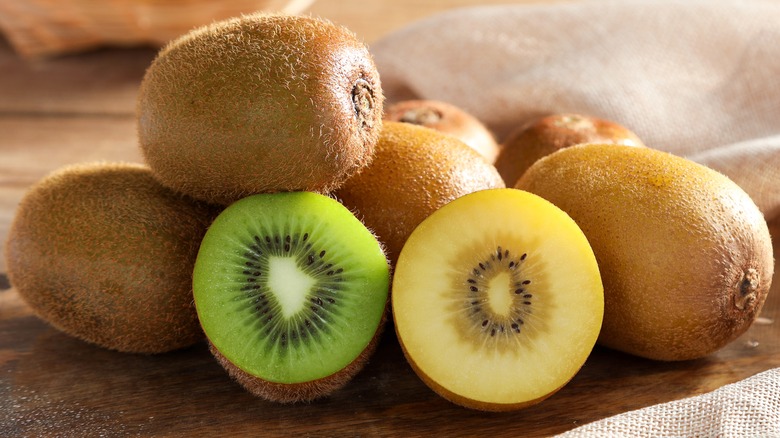The Underrated Fruit That Can Support Digestion And Help Reduce Bloat
Abdominal bloating is one of the most common health complaints, affecting millions of people worldwide. Estimates show that up to one-third of Americans experience this problem regularly, according to a 2011 review featured in Gastroenterology and Hepatology. These rates are even higher among those with irritable bowel syndrome (IBS), a digestive disorder that causes gas, diarrhea, constipation, and stomach pain. As the researchers note, bloating can be severe enough to interfere with daily activities and increase stress.
Researchers don't fully understand what causes this digestive problem. Common triggers include constipation, small intestinal bacterial overgrowth, IBS, and gynecological conditions, explains Johns Hopkins Medicine. Anxiety, depression, and psychological stress may play a role, too. Additionally, certain foods are hard to digest and can ferment in the stomach, making symptoms worse.
For example, most fruits contain fructose and sugar alcohols, two types of carbohydrates that may cause gas and bloat. Another culprit is pectin, a soluble fiber in apples, pears, plums, beetroots, carrots, and other fruits or vegetables, says POPSUGAR. This doesn't mean you should cut out these foods, though. Small things, such as peeling or cooking your favorite fruits or serving them with probiotic foods, can make all the difference.
Also, there's one fruit that may reduce bloating and boost digestive health. You can enjoy it as a snack, blend it into smoothies, or add it to salads to reap the benefits.
Eat this fruit more often to get rid of bloating
Did you know that kiwi can speed up digestion and prevent bloating? This tropical fruit contains actinidin, an enzyme that breaks down protein and supports bowel function, according to 2018 research published in the European Journal of Clinical Nutrition. It's also an excellent source of fiber, polyphenols, kiwellin, and other nutrients that increase intestinal motility. In clinical trials, kiwi has been shown to relieve constipation, improve stool consistency, and decrease transit time.
Need more proof? In one 2021 study published in The American Journal of Gastroenterology, researchers investigated the effects of psyllium husk, prunes, and kiwifruit on 79 patients with chronic constipation. Subjects consumed 3.5 ounces of prunes, 0.4 ounces of psyllium, or two kiwis per day for one month. All three groups experienced improvements in constipation symptoms, including less bloating and reduced straining. However, those who ate kiwifruits had the lowest rate of side effects.
A 2019 study published in Alimentary Pharmacology & Therapeutics suggests that kiwi may serve as a natural laxative and stool softener. The fruit increases fluid retention in the digestive tract, leading to softer stools and more frequent bowel movements. Scientists attribute these benefits to the fiber in its cell walls — it has six times the water retention capacity of apple fiber. What's more, kiwifruit is over 83% water and has roughly 90 calories per serving (per MyFoodData), making it ideal for dieters and healthy eaters.


